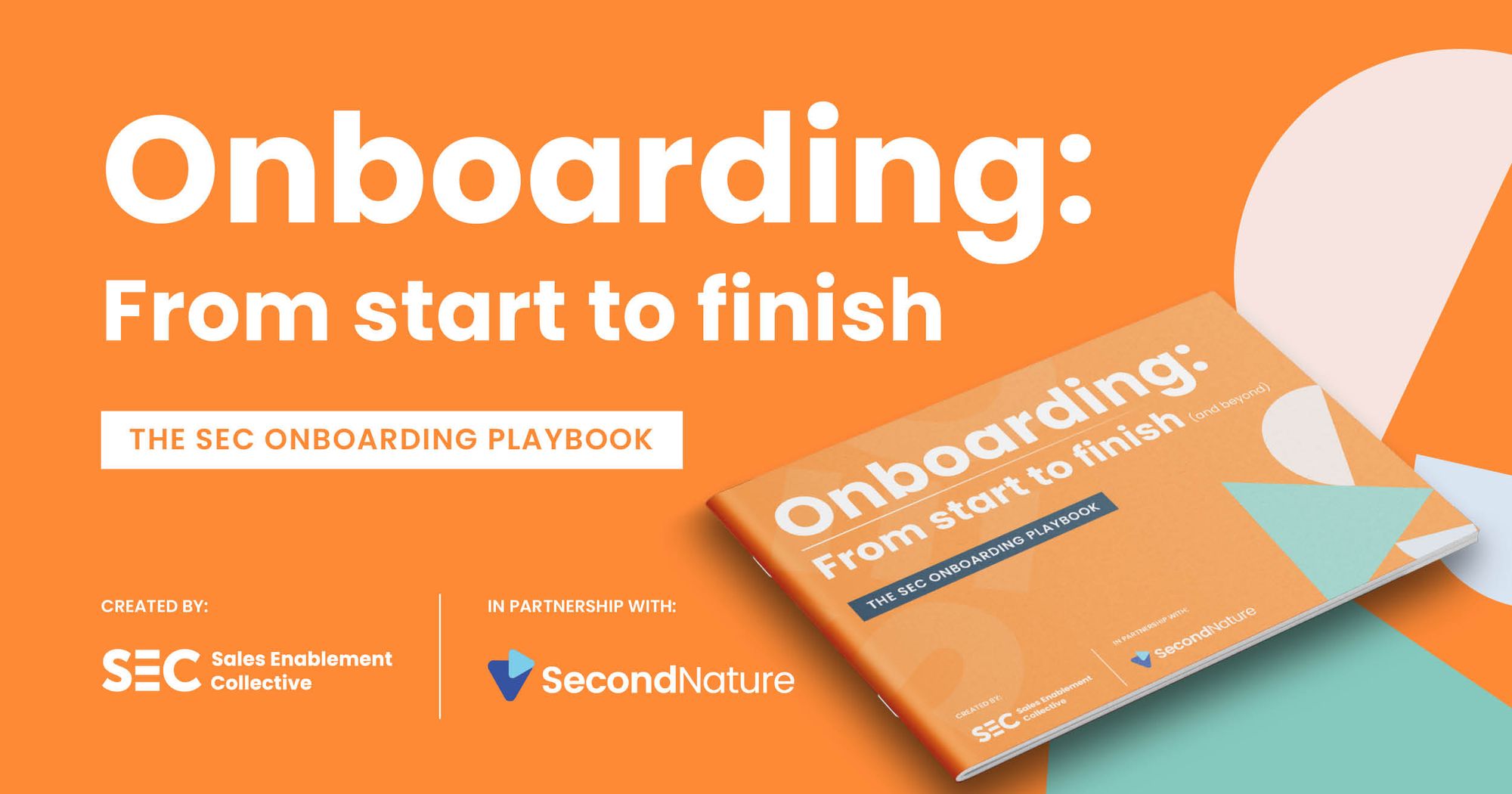- Why mental health and mindset?
- Resiliance is revenue
- Mental health and mindset as a DEI&B strategy
- Isn't this the front line manager's job?
- Strategies for incorporating mindset training into your enablement strategy
Why mental health and mindset?
When I set out to build my first sales onboarding program, my goal was to create a framework that would launch new SDRs and AEs into a fast ramp and, hopefully, long and productive tenure at the company.
It included industry and product training, pitch practice, and tech stack how-tos, of course.
But it was equally as important to me to include a mental health and mindset session in their already quite busy first week on the job.
Why?
Because traditional sales training puts an imbalanced focus on how to win, and very little airtime on how to lose.
I remember working as a founding member of the sales team at an early stage startup.
We were selling enterprise-size deals, so losing one felt like letting the whole company down. It was also rare that I could walk away from a likely poor fit who was interested in us. (“We can make it work!” “We can get scrappy!”)
So much wasted effort - for me when I could have been calling someone else, for engineers abandoning strategic work to whip up a proof of concept, for senior leadership getting on calls with anyone from tire kickers to industry visionaries who ultimately wouldn’t buy.
Only secure people with secure leaders can lose well, especially in the current economy where security feels like a cozy pipe dream from a pre-pandemic world.
Salespeople who feel secure have a higher chance of hitting their personal goals and contributing in line with their company’s expectations:
- They’re confident in the value they can offer potential customers, and comfortable walking away from deals that shouldn’t close or can’t close today.
- They’re able to maintain a healthy perspective in the job, leveraging a long term view when experiencing a lost deal or low point, and tapping into the energy and opportunity each day brings.
- They feel connected to their colleagues and are comfortable with the level of authenticity they bring to the workplace, which helps them perform at their best.
While a full systemic overhaul may be called for in tech sales, I believe that enablement professionals can begin to fortify their sales teams with trainings and conversations that build mental strength and resilience.

Resilience is revenue
Enabling salespeople to recover from rejection is just as important as passing along winning strategies and wisdom from top performers in the organization.
Both can and should exist in onboarding enablement programs.
Depending on various factors, we know that it’ll likely take several touchpoints for a salesperson to book a meeting (Fanatical Prospecting by Jeb Blount cautions between 5 - 20 for a somewhat familiar prospect, and higher than that for cold prospects).
Traditional enablement trains new hires on how to use the dialing system, winning verbiage for emails, and strategies for connecting and messaging on LinkedIn.
And sure, we coach them to pick up the phone again after being called a bottom feeder by an angry voice on the other end.
After all, according to the data they’re statistically closer to getting the meeting than we were before that call!
But salespeople are…people.
So often, they know what to do, but still we see anxiety and burnout leading to call avoidance and other examples of drag (Gartner), which holds them back from taking the action needed to be successful.
Navigating and dealing with rejection is an inside job, and it can be personal, vulnerable, and therefore difficult to talk about.
Enablement professionals aren’t mental health care professionals, but if we truly want to unlock the revenue potential of our sales teams, we have to bring resilience training into the broad toolset of onboarding and ongoing enablement.
Mental health and mindset as a DEI&B strategy
Imagine your sales organization is about 80-90% happy with their plan and execution of recruiting a diverse population to their sales team. (I’m not sure anyone’s getting this 100% right - leave a comment if you are.)
You have a group of new SDRs and AEs who are diverse in many ways: age, race, gender expression and identity, and more.
They’re also diverse in their work background.
Maybe you have new hires who have:
- Sold door to door - insurance, solar panels, knives, you name it
- Several years of experience selling SaaS
- High volume agency recruiting experience
- Taught high school students
- Just graduated college 5 minutes ago
All in one group!
Congratulations - they’re bringing a wealth of experience to your sales organization and likely have different perspectives on mindset and resilience that have helped them navigate the ups and downs of their career and life thus far.

Enablement can create an environment in which this information is accessible and immediately useful for other new hires during onboarding.
It’s a form of leveraging the peer-to-peer learning that has long existed in enablement strategies, and the benefits can be significant:
- Folks outside of tech could be struggling with imposter syndrome when starting in a new role. Asking them to share their learned expertise reminds them of the value they bring to the table while they’re “drinking from the fire hose”.
- Encourage folks to bring their whole selves to work from the very beginning of their time at the company, within the sales organization. Unfortunately, even today, in many companies authenticity and vulnerability are welcomed in spaces like ERGs, but can be divorced from the sales organization.
- Finding some common ground with a group of people who are different from you is how we build diverse teams that thrive - and stay. In The Transparent Sales Leader, Todd Capioni points out the importance of shared experiences in achieving security as a group. Security staves off loneliness, which hurts cognitive function and is, simply put, bad for business.
For people of color and other folks who are more likely to experience burnout at work, due to code switching, microaggressions, and the myriad other realities of working in a largely homogeneous tech sales world, connection is especially vital.
Creating an environment where salespeople can connect and be real with each other is a way of taking a thoughtful approach to team belonging in a way that frankly isn’t happening on a lot of sales teams.

Isn’t this the front line manager’s job?
Or, more empathetically said:
As an enablement professional, I’m “one to many”, not “one to one” - wouldn’t each salesperson’s direct manager be a better person to coach on mindset?
Yes - their frontline manager is their most important coach and advisor during their time at the company. Depending on how your enablement charter is set up, mental health and mindset coaching may seem to fall outside of enablement’s scope.
However, I challenge enablement professionals to start the conversation about this with your revenue leadership team.
If secure salespeople are stronger salespeople who perform better, it’s in all front line managers’ best interests to follow your lead and collaborate with you on recreating the safe space you created in onboarding (more on that below) in one-on-ones and coaching conversations with their reps.
Enablement often has the great privilege and challenge of curating those first few days on the job for salespeople. Having an opportunity to learn tools for resilience alongside tools for prospecting may be a first for your new hires.
Align with front line managers so they’re aware of the session that’s happening in onboarding, and enable them to continue the conversation in their 1:1 relationship with the new hires.
Strategies for incorporating mindset training into your enablement strategy
Spark a conversation with your sales leader partners
Here are some great questions to start with from The Transparent Sales Leader by Todd Capioni:
- How do you deal with negative things that happen to you?
- How does your team deal with negative events?
- What is the level of anxiousness and self doubt for the required activities to be successful?
Bring in an expert
Consider bringing in an expert on mental health in sales like Jeff Riseley to lead a conversation with your management team on your team philosophy around mental health, mindset, and resilience.
Crowdsource resources for your team
Crowdsource and compile mental health resources in various formats including written articles, video to engage different learning styles and abilities.
Make this available to salespeople on demand in your knowledge management system just like other training content.
Partner with ERGs
Partner with your organization’s ERGs to inform your mindset training and content through diverse lenses.
Incorporate a mindset session into onboarding
If you choose to incorporate a mindset session into new hire onboarding:
- Share data that shows the importance of having strong mental health in sales. The Sales Health Alliance has a number of reports and resources available.
- Get them laughing (TikTok and YouTube are great for this! Check out Morgan Ingram’s TikTok to start) about the shared struggles that everyone experiences in sales. Connection is a powerful antidote to the rollercoaster of sales.
- Invite folks to share their own experience of navigating losing deals, dry spells, missed quarters, and the daily rejection of the job. Especially for experienced folks, what’s their “go to” for self care and resilience? This can be a huge learning opportunity for new (to sales) folks to see that failure is part of the journey, not the end of the story.




